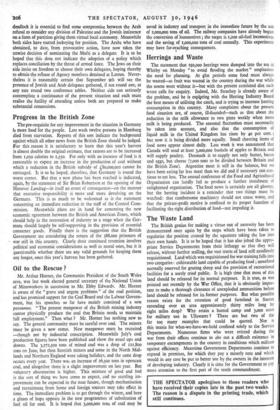Oil to the Rescue ?
Mr. Arthur Homer, the Communist President of the South Wales area, was last week elected general secretary of the National Union of Mineworkers in succession to Mr. Ebby Edwards. Mr. Horner is aware of the "grave and urgent problems" of the coal position, and has promised support for the Coal-Board and the Labour Govern- ment, but his speeches so far have mainly consisted of a non possumus. "The present manpower of the British mining industry cannot physically produce the coal that Britain needs to maintain full employment." Then what ? Mr. Horner has nothing new to say. The general community must be careful over coal. The miners must be given a new status. New manpower must be recruited —though not by industrial conscription. Meanwhile July's coal production figures have been published and show the usual ups and downs. The 3,272,500 tons of mined coal was a drop of 121,800 tons on June, but then Scottish miners and some in the North Mid- lands and NorthernIngland were taking holidays, and the same drop occurs every year. There was an increase of 26,500 tons in opencast coal, and altogether there is a slight improvement on last year. But voluntary absenteeism is higher. This mixture of good and bad is the sort of thing we have come to expect, and no startling im- provement can be expected in the near future, though mechanisation and recruitment from home and foreign sources may take effect in time. The immediate problem is to get through the winter, and here a gleam of hope appears in the new programmes of substitution of fuel oil for coal. It is hoped that 3,000,000 tons of coal may be saved in industry and transport in the immediate future by the use of 2,000,000 tons of oil. The railway companies have already begun the conversion of locomotives ; the target is r,2oo oil-fuel locomotives and the saving of t,000,000 tons of coal annually. This experiment may have far-reaching consequences.


























 Previous page
Previous page